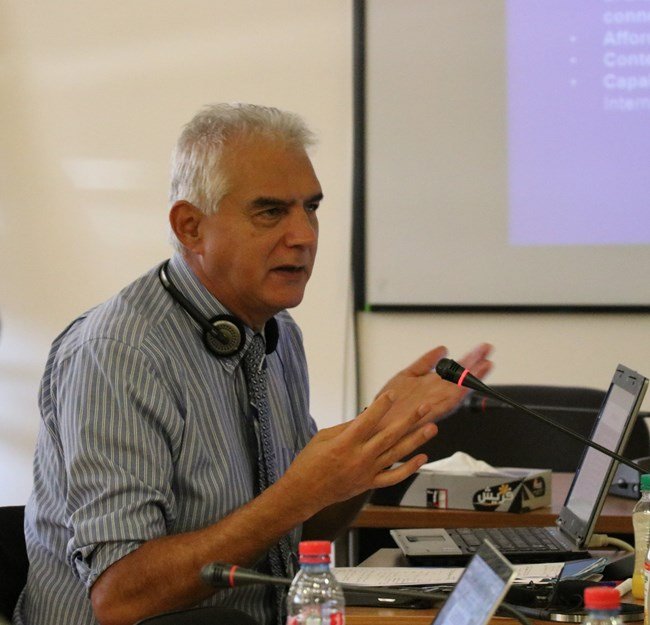Image:

24 Oct 2017
<strong>25 Oct. 2017</strong> <br />
<br />
<strong>Amman - </strong>Today UNESCO held two consultation sessions on the <a href="https://en.unesco.org/internetuniversality/indicators">Internet Universality Indicators</a> at Jordan Media Institute. The consultation sessions were attended by over 20 Internet experts including government representatives, private sector representatives, data protection advocates, privacy experts, academia and members of civil society and educational institutions. UNESCO Director for Freedom of Expression and Media Development Director Guy Berger presented the Organisation’s new project “Defining Internet Universality Indicators”. The initiative aims to develop indicators for governments and other stakeholders to measure Internet development at the national level and promote the norms and values based on the ROAM principles (which encourage the Internet governance to be based on human <strong>Rights, Openness, Accessibility, and Multi-stakeholder participation</strong>).<br />
<br />
Each consultation session focused on two of the four principles, the first session included government and private sector representatives and focused on the Openness, and Accessibility Indicators. The second session included members of academia, civil society and the media and focused on the Rights-Based and Multi-Stakeholder Participation Indicators.<br />
<br />
“The Internet is more and more part of daily life, with huge potential for the sustainable development of our societies,” said Mr. Berger. “This is why UNESCO is developing a research tool to map different dimensions, so that stakeholders in a given country can see the big picture and be empowered to make evidence-based decisions about how best to use and govern the Internet.”<br />
<br />
The event today in Amman was a unique opportunity for Jordanian experts to contribute to defining the authoritative global research tool for voluntarily assessing Internet development within countries. It was the first Internet Universality Indicators consultation session in the Arab world.<br />
<br />
Speaking about defining the Accessibility indicator, Dr. Baha’ Khasawnah, Director General of National Information Technology Center, noted that bridging the digital divide, improving digital literacy, and empowerment of women and youth are key issues in internet accessibility in Jordan. “Assessing digital literacy could be measured by assessing the number of people that have been trained, measuring the amount of bandwidth in schools, resources that have been accessed, number of downloads, uploads and how many new subscribers are joining. As for the digital divide, measuring the success is difficult. In our experience, we have measured the numbers we have trained and how many people have returned for training,” he added. <br />
<br />
“In addition to the four indicators, it may be interesting to add an indicator related to ethics on the internet, as well as to consider the rights of refugees and the rights of people with disabilities,” said Dr. Abdullah Ababneh, Head of the National Centre for Human Resources Development.<br />
<br />
For the Openness indicators, the issues discussed include open standards, open source, open access, open data, and open markets. “We are very interested in using the indicators that are developed as part of this project, because it is a gap and it would be very useful to know and apply them,” added Dr. Khasawneh. <br />
<br />
The consultations were organized with the contribution of the EU funded and UNESCO implemented <a href="https://en.unesco.org/partnerships/foe/support-media-jordan">“Support to Media in Jordan”</a> project as part of continued efforts to support an enabling environment for freedom of expression.



